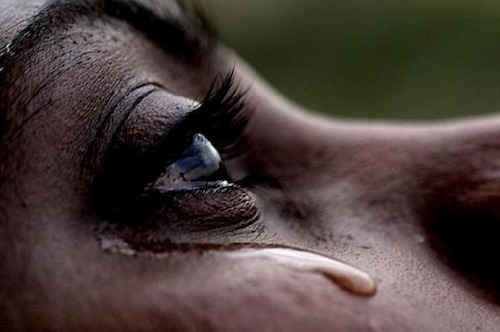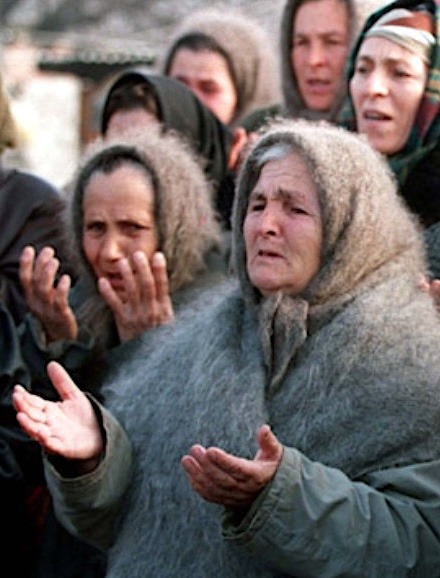
One of the most problematic parts of Scripture for Christians is what are called “Imprecatory Psalms,” psalms which include cursing of a person’s enemies.
Aren’t we taught to love our enemies? Why does the Bible show us examples of people praying for God to harm them instead? Like in Psalm 69 we hear:
They gave me poison for food,
and for my thirst they gave me sour wine to drink.
Let their own table before them become a snare;
and when they are at peace, let it become a trap.
Let their eyes be darkened, so that they cannot see,
and make their loins tremble continually.
Pour out your indignation upon them,
and let your burning anger overtake them. (Ps. 69:21-24)
I was discussing this with my colleague Milly Erema, the Old Testament professor from Uganda and she had a fascinating answer from her traditional East African background, which I think sheds light on the biblical text.
In the tribal society where Milly comes from, vulnerable people like widows and orphans had little protection. Think of when Judah would not give Tamar, his daughter-in-law, as wife to another son after her own husband had died (Genesis 38). This was very much expected in that period, because without a husband, women are utterly destitute. Tamar would not be able to live on her husbands’ share of the family’s property, or have children to care for her in her old age. Yet no matter how much she pleaded, she had no way to force Judah’s hand.1
Among Milly’s people, a young widow in a situation like this would walk back and forth through the village, wailing about her plight and crying out to God, pleading for his righteous judgment to come. The village elders would intervene and have a discussion with the offending family about the situation, and tell them that they needed to respond to her need, lest God punish the whole village for it.

The Torah actually affirms this kind of action! God warned the Israelites,
You shall not mistreat any widow or fatherless child. If you do mistreat them, and they cry out to me, I will surely hear their cry, and my wrath will burn, and I will kill you with the sword, and your wives shall become widows and your children fatherless. (Exodus 22:22-24)
Because God is a just and loving God, he will act on the behalf of the most vulnerable and respond to the outcry of the oppressed. The widespread fear of God’s punishment was what protected widows and orphans from every kind of exploitation. So there is a very good reason for curses, to remind potential bullies that God’s just judgment would come on them for their deeds.
In traditional villages, Milly comments, religious faith is very high and the threat of being cursed is very protective to the vulnerable. But people who move to the cities often become atheists and there is little safety to be found for the most helpless in Uganda.
God Responds to the Outcry
The Hebrew word for “outcry” is tze’akah. According to Jewish scholar, Nahum Sarna, this word (and the related verb that means to “cry out”) is
…suffused with poignancy and pathos, with moral outrage and soul-stirring passion. God heeded the “outcry” of His people against the harsh slavery of Egypt in Exodus 3:7; His “anger blazes forth” when He hears the “outcry” of the ill-treated widow and orphan in Exodus 22:21–23…
Tze’akah is especially used in connection with the suffering of the poor and the impoverished victims of avaricious exploitation.2
Even in the New Testament we find the idea of an “outcry” to God. James warns the rich that their wealth may be crying out against them if they have defrauded any of their employees:
Behold, the wages of the laborers who mowed your fields, which you kept back by fraud, are crying out against you, and the cries of the harvesters have reached the ears of the Lord of hosts. (James 5:4)3
 James is alluding to Genesis 4:10, where after Cain kills Abel, God tells Cain that Abel’s blood “cries out against him from the ground.” The striking imagery here reveals God’s horror at this senseless murder, and the implications are that the blood is actually saying something, metaphorically.4 The blood is pleading with God that he avenge the death of the innocent.
James is alluding to Genesis 4:10, where after Cain kills Abel, God tells Cain that Abel’s blood “cries out against him from the ground.” The striking imagery here reveals God’s horror at this senseless murder, and the implications are that the blood is actually saying something, metaphorically.4 The blood is pleading with God that he avenge the death of the innocent.
In the same way, James vividly imagines that the wages in a corrupt employers’ pocket as calling out, “Hey! Hey! I still need to be paid to the people who worked for you!”
The idea that the “blood” of the murdered cries out to God is also something that many traditional tribal groups in East African are aware of. When a family buys land, they often offer a sacrifice to purify the land of any past bloodshed (which is unfortunately common in war-torn Uganda).
God’s Ultimate Response to an Outcry
In Psalm 22, the afflicted psalmist describes his woe and suffering as surrounding mobs mock him and then attack him like lions. Christians universally understand this psalm as describing the death of Christ. But the psalm actually ends with praise, because
God has not despised or abhorred
the affliction of the afflicted,
and he has not hidden his face from him,
but has heard, when he cried out to him. (Psalm 22:24)
This line, that God “has heard when he cried out to him” sounds weak in English because to us, to “hear” simply means that sounds entered our ears. But in Hebrew, the verb for “hear” (sh’mah) encompasses the idea of responding to what is heard. When Rachel proclaimed that God had “heard her voice,” it means that he had answered her prayer in giving her a son (Gen. 30:22). Likewise, when God he “hears an outcry,” he launches into action to liberate and redeem the sufferer, and punish their oppressor. So the psalmist continues,
From you comes my praise in the great congregation;
my vows I will perform before those who fear him.
The afflicted shall eat and be satisfied;
those who seek him shall praise the LORD!
May your hearts live forever!
All the ends of the earth shall remember
and turn to the LORD,
and all the families of the nations
shall worship before you. (Psalm 22:25-27)
~~~~~
[Photos: Wikipedia, Restored Ministries, NPR]
1 Tamar was actually seen as a heroine in the Bible, which also leaves us scratching our heads. I’ve written more her cultural and ethical situation at this link.
2 Nahum Sarna, The JPS Torah Commentary on Genesis (New York: Jewish Publication Society, 1989), 132.
3 James makes this statement about God’s potential punishment after he has warned his readers,
“The tongue… is a restless evil, full of deadly poison. With it we bless our Lord and Father, and with it we curse people who are made in the likeness of God. From the same mouth come blessing and cursing. My brothers, these things ought not to be so.” (James 3:8-10)
So even though James tells us that we should bless rather than curse, he has no problem preaching judgment on the corrupt actions of those within the church.
4 A very well known rabbinic sermon about Genesis 4:10 is that in Hebrew, the word is not dam (“blood” in the singular), but damim, “bloods” in the plural. The “bloods” of Abel cry out against Cain. From this we learn that the shedding the blood of one person has effectively shed the “bloods” all of his/her potential descendants. This is the basis of the well-known rabbinic saying, “To save one life is to save a world.”
~~~~~
Note: Rev. Dr. Milly Erema will be in the US during the fall of 2024, and she and I will be sharing lots of insights like these in seminars and writing projects. Check out the seminar we will be doing in central Florida. If you are interested in having us speak to your group this fall (by zoom or in person during October 2024) please contact me at tverberg [@] ourrabbijesus.com.
H says
As an African woman with no one but God to turn to, I have very often turn to the imprecatory psalms. It was better to do in the face of renewed and unpunished injustice than to resort to suicide or take matter into my own hands. Westerners tend to read and interpret the Bible through their contemporary individualistic culture where Yeshua is seen as one of them. And yet, the Bible is about universal truths that play out in a collectivistic society where you can’t always fend for yourselves, even if you want to. So, what do you do if your rights are infringed by powerful people? You turn to God and ask Him through the imprecatory psalms to deal with the wicked people. Yeshua did say to pray for your enemies but at some point, when you’re faced with a person who delights in hurting you, the word “pray” has to take another meaning. Lately, a fellow Christian told me to give a present to someone who is still hurting me in unimaginable ways and in a relentless manner. I replied that no one would expect a rape victim to cajole their rapist while they’re raping them. So, thank you, David, for putting down the sorrow and the outcries of so many people, believers included, throughout the ages.
Lois Tverberg says
H, thank you for sharing your personal experience! Indeed there have been many people who have had nowhere to turn but the Psalms to know how to pray.
Gwendolyn Lucass says
This is so awesome!!! Those types of psalms have always disturbed me! Now they make sense!!! Thank you so much!! I have a question 🤔?! Can we cry out to God regarding wicked leaders as well? My son was raised in a Christian home and is caught up in a cult 😳 that rejects Christianity!! Should I be praying against the leaders and the damage 💔 being done to their followers?!!
Marcia Gray says
As Lois stated, pray for their salvation along with your family. One of the scriptures I love is the one in which God says He will hedge up their way. Hosea tells of this , so that they cannot reach their “lovers” they will in due course turn to HIM, blessed be His Name. This may sound like a curse for the way to be hedged with thorns, but it ends in Praise.
Lois Tverberg says
Gwendolyn, I would think it’s just fine to ask God to thwart the plans of the wicked. But I’m not sure how healthy it is, spiritually, to spend a lot of time praying curses. When I tried it for a little while, I found that my attitude quickly became quite negative.
There is an expectation, biblically, that if there is a way to address a bad situation, we should do it ourselves. Jesus says that if your brother sins against you, go to him and show it to him. I think praying curses must be the last option, when we are helpless, unable to do anything else.
Understanding that Christ can bring repentance to the worst sinners makes me want to pray for God to change these leaders, and prevent others from becoming involved.
Lucas says
Thank you so much for your response!!!
Fred says
You are so in tune to the Jewish/Hebraic culture and traditions.
I always learn something new from you.
I would like to support you web page.
Shalom
Lois Tverberg says
Fred, you are so kind. I appreciate your generous spirit so much. After another person asked a question like this, I wrote this post in response:
https://ourrabbijesus.com/supporting-and-praying-for-lois-as-an-author/